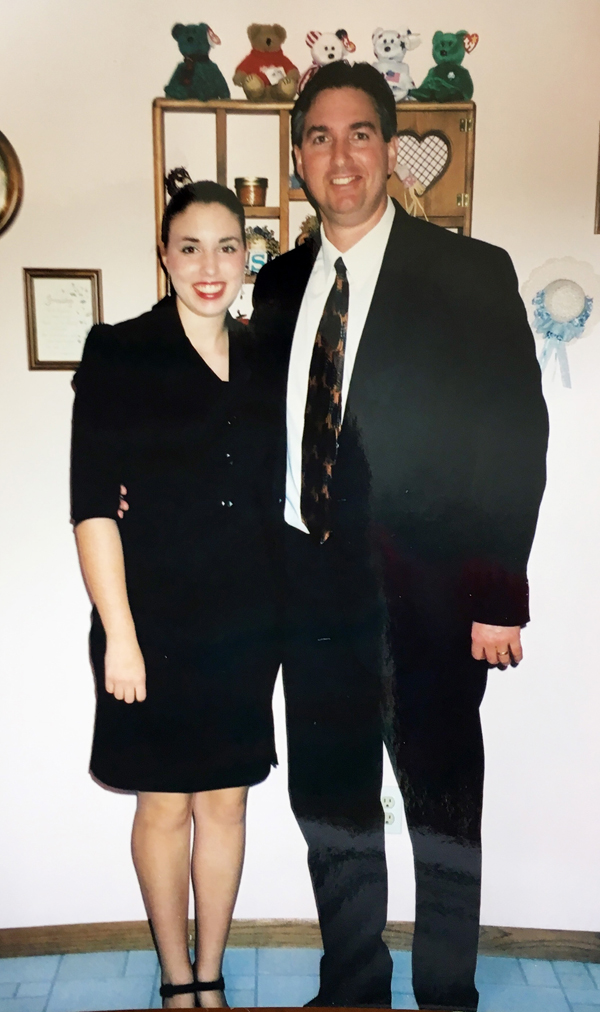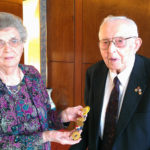By Lindsay Steele
The Wednesday before Memorial Day, my mom was babysitting my son, Bradley. She took him to the cemetery where my dad’s remains are buried, and Bradley helped her decorate the gravestone with flowers. As she usually does when she babysits Bradley, my mother texted me photos.

Lindsay Steele and her dad, Brad Schoon.
As I looked at the photos, I felt pangs of guilt. I realized that, at age 2, my son has been to my dad’s grave more than I have in the 11 years since my dad’s death.
My reluctance to visit the cemetery has nothing to do with bad feelings towards my dad. In reality, I was very close with my father. I was a daddy’s girl. I could tell him anything. He was always supportive of my interests. He would stand up for me if a student or teacher was bullying me. He always had my back. We went on trips together — just him and me — either to motorcycle rallies or music concerts.
When he was diagnosed with ALS/Lou Gehrig’s disease shortly after my college graduation, I was devastated. Although I had dreams of landing a journalism job elsewhere, I decided to put my career on hold and put down roots in the Quad Cities to be close with him while he dealt with his terminal illness.
However, during the five months that he was ill, I wasn’t around much. When I was home, I wasn’t emotionally present. I chose to occupy my time by hanging out with friends or obsessing about the boy I liked at the time.
When my dad was just days away from death, I realized I had squandered my time and I tried to be more present to him. But even then, I was adamant that I did not want to be in the room when he passed away. I wanted my last memory to be of him still alive. My family respected my decision.
I later realized that this — avoidance — was my way of handling a very difficult situation. Whenever my father’s decline became overwhelming to witness, I focused on something — anything — else. After he died, I rarely thought of him. When a memory came into my mind — even a positive one — I tried to think about something else so I wouldn’t become angry or sad. The idea that he “isn’t suffering anymore” or is “in a better place” never provided much comfort, as the idea of being in some other realm without my mom, sister and me was agonizing for him. He lamented the fact that he would never get to enjoy his future grandchildren.
Even though I decided to name my son, Bradley, after him, I don’t allow people to call him Brad, like grandpa. I’ve been known to get pretty testy if someone accidentally does so.
My realization about my lack of visits to his grave sparked something in me. Yes, it is uncomfortable for me to think about Dad and acknowledge the circumstances, but I realized that if my son is to know his grandfather at all, I need to talk about him. I need to share memories. I can’t keep his memory alive if I refuse to talk about him.
I recently shared my thoughts with Bishop Thomas Zinkula on the way back from a Mass in Grinnell. He knew my dad in college, and lost his own father shortly before being appointed Bishop of Davenport. While I don’t recall his exact words, he reinforced my desire to start honoring my dad’s legacy, even though it can and will be painful at times.
I’ve been attempting to recapture memories through journaling my experiences with Dad and with grief. I’ve found myself feeling more joy than pain in this process. I feel like, in some ways, I’m bringing him back to life, and that feels good.
I always tell young adults who have lost a parent not to let other people dictate how they should grieve or how long they should grieve. Grief is not a stage, or a set period of time, in my opinion. It is a process. I should know —it’s taken me 11 years to start fully processing my dad’s death.
Readers, know that help is out there and that seeking it does not indicate weakness. It’s my belief that it takes a great deal of strength just to get up in the morning on days when grief hits hardest. Personal counseling, group counseling and grief support groups are available. Several grief support groups meet regularly at parishes in our diocese.
My father would have been 58 years old on June 8. I’ve made it a goal to visit his gravesite this month for the first time since his burial. I realize this might not seem like a big deal for those who visit loved ones’ grave sites regularly, but it’s a big milestone for me in my ongoing journey through grief.
(Editor’s note: Lindsay Steele is a reporter for The Catholic Messenger. Contact her at steele@davenportdiocese.org or by phone at (563) 888-4248.)











